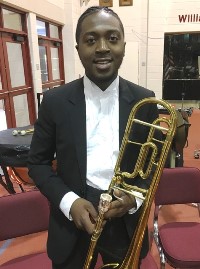
Dr. Isrea Butler picked to direct the 369th Experience Band
Wednesday, May 31, 2017
Dr. Isrea Butler embarks on a seminal personal journey this summer alongside young musicians who together will retrace the footsteps and performances – symbolically and literally – that will show how a World War I military band overcame segregation and changed history.
Butler, former director of wind ensemble and brass at the University of Maryland Eastern Shore,* will direct a series of musical tributes to the 369th Regimental Band as part of the centennial commemoration of America’s role in the “Great War.”
The former U.S. Marine will apply his teaching and directing background to responsibilities once handled by James Reese Europe, the original director of the so-called Harlem Hellfighters’ band.
Music historians credit the original 65 African-American and Puerto Rican musicians in that band with introducing an American form of performance art to Continental Europe, where a century ago mechanized and chemical weapons were used for the first time.
“They took jazz to Europe,” Butler said of the World War I musicians. “That’s why the French love jazz. They are the biggest jazz fans on the planet.”
Butler, a trombonist who has toured and recorded with such legendary jazz orchestras started by Count Basie, Cab Calloway, Duke Ellington and Lionel Hampton, accepted an invitation to head up the re-enactment project for a non-profit organization underwritten by the Coca-Cola Foundation and endorsed by the U.S. World War I Centennial Commission.

Butler is overseeing the selection and rehearsals of student-musicians from historically black colleges and universities, who this summer will start performing as the 369th Experience Band at events coinciding with the centennial commemoration.
Tré Oliver, a rising sophomore at UMES, is among six trombonists who will be working to master a style of music for which recordings exist, but are not nearly as crisp to grasp nuances of the original performances.
“It’ll be a 100 percent U-turn for me,” said Oliver, who gravitates to gospel and Go-go, a musical subgenre associated with funk in the Washington, D.C. club scene. “Everything I’ve ever played until now is different. But I’m starting to like it.”
The original 369th Infantry Regiment endured racism common in the early 20th century. When America entered the war in 1917, an all-black National Guard unit based in New York thought it would become part of the U.S. Army’s famed 42nd Infantry known as the “Rainbow Division.” The regiment, however, was not allowed to march in a send-off parade because its commanders were told “black was not one of the colors of the rainbow.”
When the 369th arrived in Europe in 1918, America’s white military leaders conscribed what they considered an inferior unit to fight alongside the French army, which embraced the black soldiers and their spirited, musically gifted band.
The regiment proved itself an able unit that flourished on the battlefield. By Armistice Day in November 1918, it had demonstrated that black Americans were up to the task of fighting gallantly for freedom and democracy.
Upon returning to New York, the regiment and its band were allowed to participate in a victory parade, a curious reversal of attitude that two years earlier had isolated the soldiers.
The story of the World War I band’s perseverance is driving the 369th Experience Band organization to focus attention on that important chapter of African American history. Stephany B. Neal, who is coordinating publicity of the re-enactment band, says one of her goals is to produce study guides about the original 369th for primary, secondary and college students.
The modern-day band, whose members started rehearsing from their respective campuses via a special Internet connection, perform publicly together for the first time July 14 at the Metropolitan Museum of Art in New York as part of the Historic Brass Society’s 3rd international symposium.
“Other performances in Harlem are also being organized,” Neal said.
The touring itinerary, which is being shaped around the academic schedules of the student-musicians, will take the band to Paris in the summer of 2018 and 2019, according to Neal. Also in 2019, it will take part in a re-creation of the original Hellfighters’ performance in “America’s Victory Parade” in New York.
After Oliver, who is from Waldorf, Md., successfully auditioned at Butler’s urging, he received a welcome package of study material that included World War I-era black-and-white pictures of the soldier-musicians.
“I’m looking at these pictures,” Oliver recalled, adding. “Hopefully, I’ll do right by them.”
Butler said he’s honored to take on the role of Europe, the original band director known as the “Jazz Lieutenant” who sadly was murdered in May 1919 shortly after his triumphant return to America.
Europe’s musicianship that contributed to jazz as an art form in the early 20th century, Butler said, are lessons he incorporates in his music history classes at UMES.
“I’ve been trying to get (Europe’s) name out there,” Butler said, “and expose him to my students.”
“As an educator, I have chance to take it to another level,” said Butler, who is a member of the Delaware Army National Guard.
* – Dr. Butler accepted a faculty position in the music department of North Carolina Central University in Durham, N.C. starting with the fall 2017 semester.

